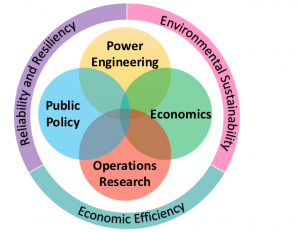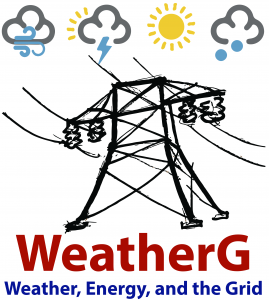Research areas
My research lies at the intersection of power engineering, operations research, economics, and public policy. I am currently working in the following areas:

- Power flow control
- Preventive power system operation during predictable hazards, such as hurricanes
- Market-Based operation of transmission system
- Coordination between interdependent infrastructure systems
- Power system optimization
- Distributed energy storage
Power flow Control:
Electricity flows according to the laws of physics, not economics. This will result in economic inefficiencies that could be avoided if system operators could control power flows. A number of mature technologies such as topology control (transmission switching) and impedance control (via flexible ac transmission system (FACTS) devices) offer some level of power flow control. However, modeling these technologies within power system operation models leads to computationally-challenging problems. Using techniques from operations research in combination with insights from power engineering, our research group develops fast and effective algorithms to enable power flow control. These algorithms are expected to substantially enhance the transfer capability over the existing transmission network, and thereby improve the economic efficiency and reliability of the grid. We also study the how power flow control technologies can be used to enhance the integration of intermittent renewable energy.
Funding agency: National Science Foundation

Publications:
- M. Sahraei-Ardakani and Y. Sang, “Discussion on Linear Modeling of Variable Reactance in ‘Co-optimization of Transmission Expansion Planning and TCSC Placement Considering the Correlation Between Wind and Demand Scenarios’,” IEEE Transactions on Power Systems, vol. 33, no 5, pp. 5808-5809, Sep. 2018.
- Nikoobakht, J. Aghaei, M. Parvania, and Sahraei-Ardakani, “Contribution of FACTS Devices in Power Systems Security using MILP-Based OPF,” IET Generation, Transmission & Distribution, vol. 12, no. 15, pp. 3744 – 3755, 2018.
- Y. Sang, M. Sahraei-Ardakani, and M. Parvania, “Stochastic Transmission Impedance Control for Enhanced Wind Energy Integration,” IEEE Transactions on Sustainable Energy, vol. 9, no. 3, pp. 1108-1117, Jul. 2018.
- Y. Sang and M. Sahraei–Ardakani, “The Interdependence between Transmission Switching and Variable-Impedance Series FACTS Devices,” IEEE Transactions on Power Systems, vol. 33, no. 3, pp. 2792-2803, May 2018.
- Q. Zhang and M. Sahraei-Ardakani, “Distributed DCOPF with Flexible Transmission,” Electric Power System Research, vol. 154, pp. 37-47, Jan 2018.
- X. Li, P. Balasubramanian, M. Sahraei-Ardakani, K. W. Hedman, and R. Podmore, “Real- Time Contingency Analysis with Corrective Transmission Switching,” IEEE Transactions on Power Systems, vol. 32, no. 4, pp. 2604 - 2617, Jul. 2017.
- M. Abdi-Khorsand, M. Sahraei-Ardakani, and Y. Al-Abdullah, “Corrective Transmission Switching with N-1-1 Contingency Analysis,” IEEE Transactions on Power Systems – Special Issue on Harnessing Flexible Transmission Assets, vol. 32, no. 2, pp. 1606-1615, Mar. 2017.
- M. Sahraei-Ardakani and K. W. Hedman, “Computationally Efficient Control of FACTS Set Points in DC Optimal Power Flow with Shift Factor Structure,” IEEE Transactions on Power Systems, vol. 32, no. 3, pp. 1733 - 1740, May 2017.
- J. Lyon, S. Maslennikov, M. Sahraei-Ardakani, T. Zhang, E. Litvinov, X. Li, P. Balasubramanian, and K. Hedman, “Harnessing Smart Flexible Transmission: Corrective Transmission Switching for ISO-NE,” IEEE Power and Energy Technology Systems Journal, vol 3., no. 3, pp. 109-118, Sep. 2016.
- P. Balasubramanian, M. Sahraei-Ardakani, X. Li, and K. W. Hedman, “Towards Smart Corrective Switching: Analysis and Advancement of PJM’s Switching Solutions,” IET Generation, Transmission, and Distribution, vol. 10, no. 8, pp. 1984-1992, 2016.
- M. Sahraei-Ardakani and K. Hedman, “A Fast LP Approach for Enhanced Utilization of FACTS Devices,” IEEE Transactions on Power Systems, vol. 31, no. 3, pp. 2204-2213, May 2016.
- M. Sahraei-Ardakani and K. Hedman, “Day-Ahead Corrective Adjustment of FACTS Reactance: A Linear Programming Approach,” IEEE Transactions on Power Systems, vol. 31, no. 4, pp. 2867-2875, Jul. 2016.
- M. Sahraei-Ardakani, X. Li, P. Balasubramanian, K. Hedman, and M. Abdi-Khorsand, “Real-Time Contingency Analysis with Transmission Switching on Real Power System Data,” IEEE Transactions on Power Systems, vol. 31, no. 3, pp. 2501-2502, May 2016.
- Y. Sang and Mostafa Sahraei-Ardakani, “Analyzing the Mutual Influence of Conventional and Distributed FACTS via Stochastic Co-optimization,” 2018 IEEE International Conference on Probabilistic Methods Applied to Power Systems (PMAPS), Boise, ID, USA.
- Y. Sang and Mostafa Sahraei-Ardakani, “Economic Benefit Comparison of D-FACTS and FACTS in Transmission Networks with Uncertainties,” IEEE PES General Meeting 2018, Portland, OR, USA.
- Q. Zhang and M. Sahraei-Ardakani, “Impact of Communication Limits on Convergence of Distributed DCOPF with Flexible Transmission,” 2017 North American Power Symposium, Morgantown, WV, USA.
- Y. Sang and M. Sahraei-Ardakani,“The Link Between Power Flow Control Technologies: Topology Control and FACTS,” 2017 North American Power Symposium, Morgantown, WV, USA. (Best Paper Award)
- M. Sahraei-Ardakani, A. Korad, K. Hedman, P. Lipka, and S. Oren, “Performance of AC and DC Based Transmission Switching Heuristics on a Large-Scale Polish System,” IEEE PES General Meeting 2014, Washington, DC, USA.
Presentations:
- M. Sahraei-Ardakani and Y. Sang, “Optimal Portfolio of Power Flow Control Technologies: Topology and Impedance Control,” INFORMS Annual Meeting 2018, Phoenix, AZ, USA.
- M. Sahraei-Ardakani and Y. Sang, “Energy Storage Planning in Presence of Topology Control,” INFORMS Annual Meeting 2018, Phoenix, AZ, USA.
- M. Sahraei-Ardakani and Y. Sang, “Coordinated Planning and Operation of M-FACTS and Transmission Switching,” 23rdInternational Symposium on Mathematical Programming (ISMP), Jul. 2018, Bordeaux, France.
- M. Sahraei-Ardakani, “Enhanced Operation of Power Flow Controllers through Efficient Algorithms,” 2018 IEEE T&D Conference and Exposition, April 2018, Denver, CO.
- M. Sahraei-Ardakani, “Operation of Power Flow Controllers: Computational Efficiency and Market Participation,” EPRI ISO/RTO Market Design Tech Conference, Feb. 2017, [Online].
Preventive power system operation during predictable hazards, such as hurricanes
 In collaboration with colleagues from Atmospheric Sciences and Civil Engineering, our interdisciplinary team aims to develop software tools to enhance the reliability of power systems during hurricanes. The project exploits the availability of weather forecast data to predict the failure probability of power system elements and integrate such estimations within power system operation models. Our preliminary results show that such framework can reduce the size and duration of blackouts anywhere between 30 to 80 percent during hurricanes. We have recently begun to employ machine learning, in order to enhance the computational tractability of our algorithm. We plan extend this work to other predictable natural hazards such as ice storms in the future.
In collaboration with colleagues from Atmospheric Sciences and Civil Engineering, our interdisciplinary team aims to develop software tools to enhance the reliability of power systems during hurricanes. The project exploits the availability of weather forecast data to predict the failure probability of power system elements and integrate such estimations within power system operation models. Our preliminary results show that such framework can reduce the size and duration of blackouts anywhere between 30 to 80 percent during hurricanes. We have recently begun to employ machine learning, in order to enhance the computational tractability of our algorithm. We plan extend this work to other predictable natural hazards such as ice storms in the future.
For more information about this collaborative initiative visit: WeatherG.utah.edu.
Funding agencies: Utah Science Technology and Research Initiative (USTAR) and National Science Foundation
![]()

Publications:
- M. Sahraei-Ardakani and Ge Ou, “Day-Ahead Preventive Scheduling of Power Systems During Natural Hazards via Stochastic Optimization,” IEEE PES General Meeting 2017, Chicago, IL, USA.
- Y. Sang, J. Xue, M. Sahraei-Ardakani, and G. Ou, “Effective Scenario Selection for Preventive Stochastic Unit Commitment during Hurricanes,” 2018 IEEE International Conference on Probabilistic Methods Applied to Power Systems (PMAPS), Boise, ID, USA.
Presentations:
- M. Sahraei-Ardakani and Ge Ou “Preventive Power System Operation During Hurricanes,” Increasing Market and Planning Efficiency Through Software, Federal Energy Regulatory Commission, Jun. 2018, Washington, DC, USA.
Market-Based operation of transmission system
Before the restructuring of the industry, the entire electric power system was treated as a natural monopoly. However, technology changes within the generation and distribution sectors have enabled the introduction of market-based mechanisms in operation and planning of the grid. Despite such changes, the transmission system has retained its status as a natural monopoly and is operated under heavy regulation. Our research group investigates the possibility of introducing market-based mechanisms to the transmission sector, for operation of active transmission assets, such as power flow controllers. Our preliminary studies show that various market-based methods can effectively manage the operation of power flow controllers, without being prone to the inefficiencies of regulation.
Publications:
- M. Sahraei-Ardakani, “Merchant Power Flow Controllers,” Energy Economics, vol. 74, pp. 878-885, Aug. 2018.
- M. Sahraei-Ardakani and S. Blumsack, “Transfer Capability Improvement through Market- Based Operation of Series FACTS Devices,” IEEE Transactions on Power Systems, vol. 31, no. 5, pp. 3702-3714, Sep. 2016.
- M. Sahraei-Ardakani and S. Blumsack, “Marginal Value of FACTS Devices in Transmission-Constrained Electricity Markets,” IEEE PES General Meeting 2013, Vancouver, BC, Canada.
- M. Sahraei-Ardakani and S. Blumsack, “Market Equilibrium for Dispatchable Transmission Using FACTS Devices,” IEEE PES General Meeting 2012, San Diego, CA, USA.
Presentations:
- M. Sahraei-Ardakani and Seth Blumsack, “A Market Design for Participation of Flexible AC Transmission System (FACTS) Devices,” 42ndAnnual Conference, Eastern Economic Association, Feb. 2016, Washington, DC, USA.
Coordination between interdependent infrastructure systems
Our research team studies the benefits of coordinated operation of water desalination and power systems. The results show a cost saving of 20 to 40 percent for water desalination, based on the level of coordination. Such savings are especially import for countries with severe water shortage, such as Kuwait, Saudi Arabia, and Israel.
Publications:
- F. Mohammadi, M. Sahraei-Ardakani, and Y. Al-Abdullah, “Coordinated Operation of Power Generation and Water Desalination,” 10th IFAC Symposium on Control of Power and Energy Systems (CPES), September 2018, Tokyo, Japan.
- F. Mohammadi, M. Sahraei-Ardakani, Y. Al-Abdullah, and G. T. Heydt, “Coordinated Scheduling of Power Generation and Water Desalination Units,” IEEE Transactions on Power Systems, early access.
Power system optimization
The optimal power flow problem, which is used for a variety of applications in operation and planning, is a large nonlinear and non-convex optimization problem. To avoid the complexities of such problem, the industry uses a linearized version of the model, known as DC optimal power flow. It is estimated that elimination of the optimality gap, by solving the original problem can save about 5 to 10 percent of the operational cost, which will translate to $20 to $40 billion annually in the US. Our research team studies various ways to develop fast, practical, and reliable algorithms for solving the nonlinear and non-convex optimal power flow problem.
Funding agency: University of Utah Research Foundation
Funding agency: Advanced Research Projects Agency--Energy
![]()
Publications:
- S. A. Sadat, D. Haralson, and M. Sahraei-Ardakani, “Security versus Computation Time in IV-ACOPF with SOCP Initialization,” 2018 IEEE International Conference on Probabilistic Methods Applied to Power Systems (PMAPS), Boise, ID, USA.
- S. A. Sadat, D. Haralson, and M. Sahraei-Ardakani, “Evaluation of Various Techniques to Warm-Start a Successive Linear Programming Algorithm for Solving the IV ACOPF,” IEEE PES General Meeting 2018, Portland, OR, USA.
Distributed energy storage
The increase in penetration of uncontrollable and intermittent renewable energy over the recent past has created new challenges in grid operation. In this project we will offer an innovate and unique solution through development of new pumped hydro storage systems, which rely mostly on existing water and wastewater treatment infrastructure.
